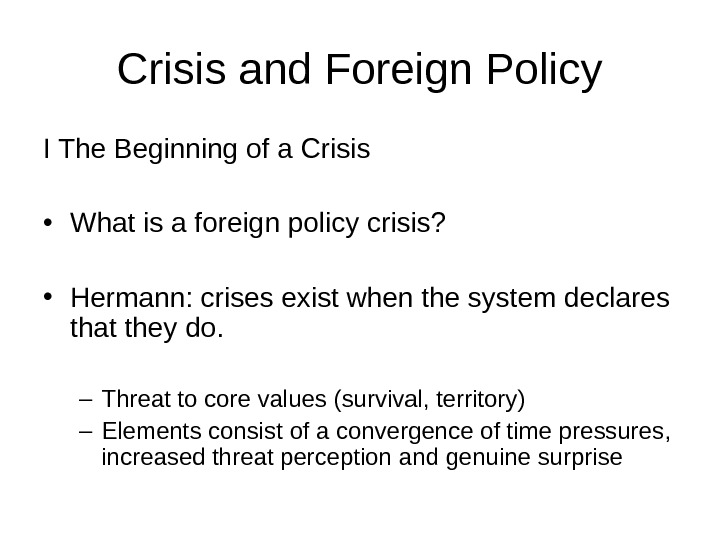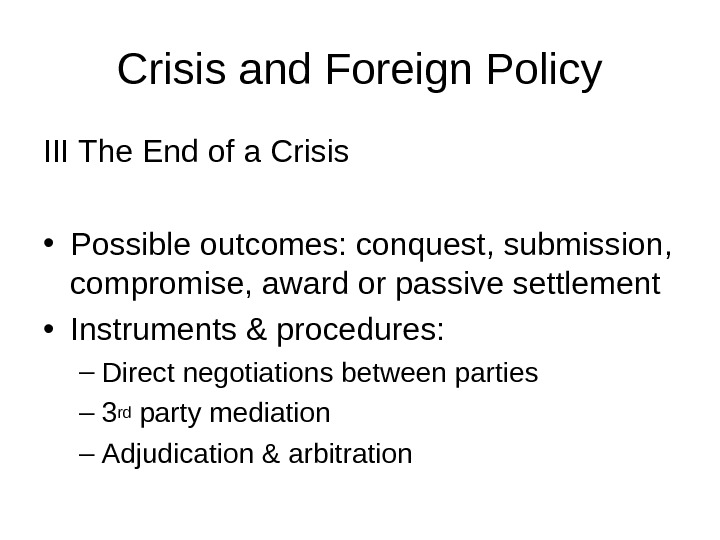Foreign Policy Analysis: crisis and foreign policy









foreign_policy_analysis_crisis_2012.ppt
- Размер: 27 Кб
- Количество слайдов: 8
Описание презентации Foreign Policy Analysis: crisis and foreign policy по слайдам
 Foreign Policy Analysis: crisis and foreign policy Dr Chris Alden LS
Foreign Policy Analysis: crisis and foreign policy Dr Chris Alden LS
 Aims and Learning Objectives • Identify the key features of crisis and their impact on foreign policy • Describe and define the importance of cognitive, psychological & heuristic factors in foreign policy decision making during crisies • Analyse the role of motivation in crises and their resolution
Aims and Learning Objectives • Identify the key features of crisis and their impact on foreign policy • Describe and define the importance of cognitive, psychological & heuristic factors in foreign policy decision making during crisies • Analyse the role of motivation in crises and their resolution
 Crisis and Foreign Policy I The Beginning of a Crisis • What is a foreign policy crisis? • Hermann: crises exist when the system declares that they do. – Threat to core values (survival, territory) – Elements consist of a convergence of time pressures, increased threat perception and genuine surprise
Crisis and Foreign Policy I The Beginning of a Crisis • What is a foreign policy crisis? • Hermann: crises exist when the system declares that they do. – Threat to core values (survival, territory) – Elements consist of a convergence of time pressures, increased threat perception and genuine surprise
 Crisis and Foreign Policy II Impact of crisis on FP decision making Janis & Mann: decision makers as emotional beings seeking to resolve internal decision conflict – Leads to stress, increased tendency towards aggressive behaviour, fixation on singular solutions (‘tunnel vision’) – Propensity to over-react to provocations (Holsti)
Crisis and Foreign Policy II Impact of crisis on FP decision making Janis & Mann: decision makers as emotional beings seeking to resolve internal decision conflict – Leads to stress, increased tendency towards aggressive behaviour, fixation on singular solutions (‘tunnel vision’) – Propensity to over-react to provocations (Holsti)
 Crisis and Foreign Policy • Time pressures & int’l ramifications – Crisis highlights information shortage and overload as time does not allow for effective collection and processing • Problems of communication & rationality – Resolution of conflict depends on contact with opponent • Enforced choices – Sense of urgency & uncertainties translate into FP decision makers perceiving there are fewer options
Crisis and Foreign Policy • Time pressures & int’l ramifications – Crisis highlights information shortage and overload as time does not allow for effective collection and processing • Problems of communication & rationality – Resolution of conflict depends on contact with opponent • Enforced choices – Sense of urgency & uncertainties translate into FP decision makers perceiving there are fewer options
 Crisis and Foreign Policy III The End of a Crisis • Possible outcomes: conquest, submission, compromise, award or passive settlement • Instruments & procedures: – Direct negotiations between parties – 3 rd party mediation – Adjudication & arbitration
Crisis and Foreign Policy III The End of a Crisis • Possible outcomes: conquest, submission, compromise, award or passive settlement • Instruments & procedures: – Direct negotiations between parties – 3 rd party mediation – Adjudication & arbitration
 Resolving Crisis and Foreign Policy • Key issue about crisis management: is it about ‘winning’ or ‘preventing conflict’? – ‘ Crisis management must address the tension between the two goals…the dilemmas of choice are glossed over by the use of the term “management” with its overtones of technical rationality and efficiency. ’ (Richardson)
Resolving Crisis and Foreign Policy • Key issue about crisis management: is it about ‘winning’ or ‘preventing conflict’? – ‘ Crisis management must address the tension between the two goals…the dilemmas of choice are glossed over by the use of the term “management” with its overtones of technical rationality and efficiency. ’ (Richardson)
 Conclusion
Conclusion

